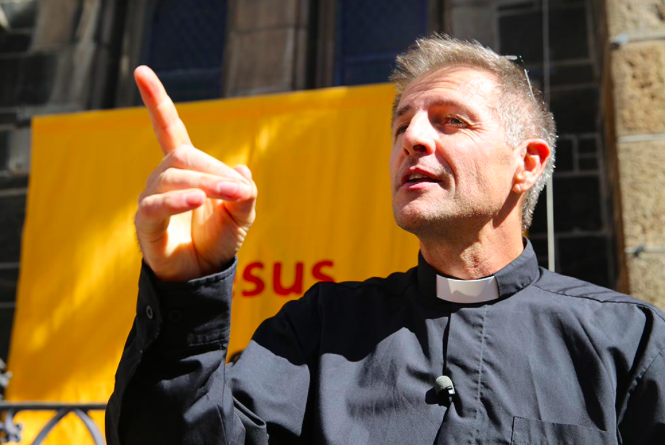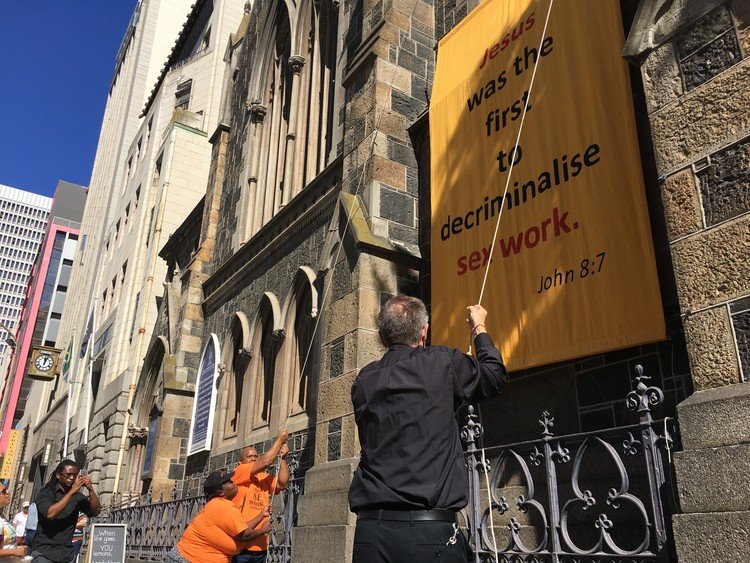Preaching For Prostitutes
Researched by Yaeesh Collins and Isabella Liss
Written by Isabella Liss
Photographs by Aiden Jones, sourced by Yaeesh Collins

Reverend Alan Storey is a man of God, and a proud advocate for sex worker’s rights. For many, his stance may come as a surprise. Isn’t it entirely contradictory? Storey shares his thoughts on sex work, why people may be opposed to it, and the importance of protecting society’s marginalised people.
“Jesus was the first to decriminalise sex work”
The Central Methodist Mission regularly hangs banners from the historic church building. People going about the bustling city centre below often see a clever play on biblical passages, and statements prompting them to think critically about current events. In 2018, Storey caused a stir with what many saw as his church’s most controversial statement: “Jesus was the first to decriminalise sex work (John 8:7),” read the large, bright yellow banner above Greenmarket Square. This referred to a biblical tale in which a village woman commits adultery. Her transgression has been interpreted by scholars as offering sex in exchange for financial stability from someone other than her partner. (Today we might apply the label “prostitute”, but nuanced definitions of intimate labour did not exist yet.) The men in her community gathered ‘round, preparing to cast stones. Jesus intervenes, stating “Let any one of you who is without sin be the first to throw a stone at her”. In analysing texts like this, focus has traditionally been placed upon sex work as a sinful act. Jesus is proclaiming that only those without sins of their own may judge — i.e. leave the judgement to Jesus. But this emphasises that any form of “deviant sex” (before marriage, or with multiple partners) is indeed a sin. For thousands of years, attention has been drawn to the status of sex work as a sin. Storey believes Christians are missing the point. Is sex work really more of a sin than stoning a woman to death? He thinks not. But South African authorities and society do not value the lives of sex workers, recently suggested by the killing of Robyn Montsumi at Mowbray police station.

How does the Bible suggest we treat sex workers?
Storey is passionate about reinterpreting biblical works, and finding compassionate, modern meaning. “The tools of my trade is an ancient text,” he explains. “I see myself as an artist. Some artists use paint, some use pastels, some use stone, some use clay. I use words. And the idea is to translate the words of then into now.” Storey often refers to the trinity of the widow, the orphan, and the foreigner. These were traditionally vulnerable people in society. As it is stated in the very first book of the New Testament, “as you did it to one of the least of these my brothers, you did it to me”. Storey believes this is a clear message to defend the marginalized in society. Metaphorically, anyone harming the vulnerable harms Jesus himself.
Storey also cites the Hebrews as an Old Testament example of vulnerable people, who God vowed to protect. The wandering Jews and slaves of Egypt became “the Chosen People”. He believes this highlights the marginalised as those of utmost importance. “That’s the only chosen-ness we are allowed. Because if we choose favourably [of] the marginalized, then the whole of society benefits.”
Storey’s philosophy is simple. Identify the “other”, and ensure their protection. Sex workers are vulnerable members of South African society, and should be protected.
Why aren’t more Christians thinking like this?
Storey believes fear is a main component in Christian “othering”. For people to feel they are pious, they must compare someone else’s actions to their own. To be an In there must be an Out. The heaven versus hell narrative is shrouded in anxiety for believers, who fear they’ll be Out. And so they aspire to perfection, losing sight of what it means to be a good person. “Most Christians will say they’re against the Holocaust, but they believe in a permanent holocaust — when you die,” Storey says. “If Jesus or God wants to put every believer in a fiery pit — a holocaust forever and eternity — that’s fine.” The hypocrisy results in discriminatory behaviour. “If it’s okay to burn someone in eternity while they’re dead, it’s much easier to burn someone while they’re alive.”
The issue is further complicated in South African society, where “othering” was enforced through apartheid ideology. Attitudes of the NG Kerk supported racism in their interpretation of Christian texts. Segregation ensured everybody saw somebody as “the other”. This history makes it easy for South Africans to marginalise their fellow people. Often, one’s behaviour is inclined to validate oppression. For many who have been raised in communities where discrimination is the default mode of viewing those who are different to oneself, self-awareness and critiquing these ideas is difficult.
Storey acknowledges that such contradictions are natural. “The truth of the human condition is hypocrisy. We don’t have to be religious to be hypocrites, we just have to be human,” he maintains. This isn’t a Christian issue, but a problem humanity continues to face.
Condemnation and Criminalisation in Unison
These ideas are particularly problematic when the law of the land supports them. The law criminalises sex workers, while religion condemns. Neither moral framework is interested in being inclusive, and as a result, neither is society.
Criminalisation has unintended consequences. Its goal (putting an end to sex work) has failed. Police brutality and decreased access to health care have only been accentuated. Storey believes the unison between condemnation and criminalisation has also affirmed people’s wrongful actions on an individual level. He says that when people enter into a relationship with a sex worker, they are more inclined to violate her violently. “Because after all, the system has done that as well,” he explains. These are specific reasons Reverend Storey and his church stand in solidarity with sex workers, and organisations such as Asijiki.
The Church and Sexuality
It makes sense that the Bible has blanket regulations about sex. In biblical times, it was believed that the entirety of life was within the male sperm. Masturbation equates to murder, as that would be wasting the sperm. Pre-marital sex or adultery would be considered foolish if two parties do not remain together to raise a family. Non-penetrative sex between same-sex parties would be a loss. Sex was purely an act of procreation. But things have changed. “Just like we don’t believe the world is flat any more, we don’t believe that false biology cause we’ve got a microscope,” says Storey. He also acknowledges that many of these interpretations surrounding sex were designed to be oppressive. “All of this stuff comes down to power, and narratives that can accumulate power. If men want to accumulate power, they interpret scriptures in a particular way that will validate their accumulation of power.”
Storey therefore recognises the newfound need for conversations around sex and sexuality in religious spaces. “For most of us, our sexuality is a very vulnerable area. An area where we’ve messed up quite a bit, an area, where we’ve been hurt and hurt others. If there’s wraps on this and we can’t speak about it, then the shadow comes out in different ways. And it will come out. We bury it in our peril and we bury it alive.” He references the Catholic Church and sexual abuse of minors. The need to speak about our vulnerabilities is clear, and decidedly less dangerous than remaining silent.
But Storey isn’t convinced that morality is subjective, nor comfortable with reducing human beings to commodities (an attitude that much sex work relies upon). He poses a simple question when confronted with decisions concerning morality. “When I’m with someone, what does respect look like?” This has led him to address sex acts in a diplomatic way. “After every sexual encounter, you [should] leave feeling more whole, more human, more beautiful, more cherished. And the other person leaves feeling more cherished, more appreciated, more beautiful. In any and all sexual relationships. Now, for me that’s an a non-negotiable ethic.” He prefers this approach to empty, blanket regulations. “I would want to suggest that that kind of language and teaching from a young age would be far more healthy and helpful than a do or a don’t.”
It is with this attitude that Reverend Storey welcomed a group of local sex workers to speak to his congregation one Sunday morning. “Religion has a particular dominant, oppressive force in the area of sex work. And therefore I feel it’s important as a congregation and church to recognise I represent as Christian is part of the problem. And therefore I need to take ownership of that and do something about it,” he says of his unconventional approach. One sex worker in particular made a powerful statement that has stayed with Storey. “You condemn us from the pulpit on Sunday, but you use us on Friday night,” she relayed in church.

What next?
Storey wants people to know he understands what draws them away from religion, and this is not the sort of Christianity he supports. “People just leave — I would leave. If it’s a god of domination, if that’s the only god I’m hearing about, then get lost. Then, it’s far more saintly to be an atheist,” he laments. As long as the Bible is an authority in people’s lives, Storey will be reinterpreting with an emphasis on compassion and social change. He also adds that all struggles have been won through protest, and so we must voice our desire for decriminalisation of sex work. Simultaneously, we should be reevaluating our own attitudes towards marginalized peoples, regardless of affiliation to religion, and examining why we think the way we do. We can then connect with any “others”, including sex workers. “As soon as there’s engagement, you discover that you won’t reduce another human being just to the sexual act”, says Storey. “You discover their humanity.”
